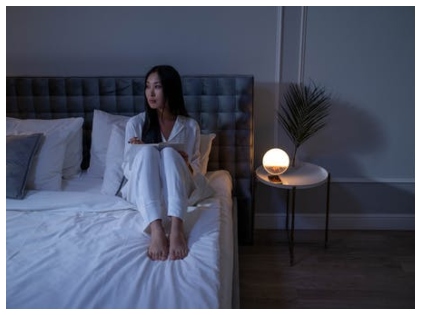
The Link Between Sleep and Mental Health

Have you ever realized that you spend over a third of your entire lifetime asleep? Sleep is an essential element of a healthy life and is just as important as breathing, eating, and drinking water. Sleep is vital if you wish to maintain a healthy body and mind. It is the body’s way of recovering from physical and mental exertion.
The Relationship Between Sleep and Health
 There is a strong relationship between good health and sleep. Poor sleep results in the decline of health just as much as poor health can result in poor sleep. If your health is deteriorating, one of the first signs will be sleep disturbances. Your physical health depends on sleep as your body recovers and repairs as you sleep, from say, exercise.
There is a strong relationship between good health and sleep. Poor sleep results in the decline of health just as much as poor health can result in poor sleep. If your health is deteriorating, one of the first signs will be sleep disturbances. Your physical health depends on sleep as your body recovers and repairs as you sleep, from say, exercise.
Your mental health also depends on adequate sleep. The two most common health problems, anxiety, and depression have links with sleep problems. The effect of sleep on mental health has been explored.
Mental Health and Sleep
You may look at a person with mental health issues and advise them to get out of bed and to pull themselves perhaps together. However, that’s not how depression works. Tiredness, lethargy, and sleep disturbances are also a part of having a mental issue. In addition to this, you need to treat some mental health disorders with medication that happens to have the side effect of causing tiredness, insomnia, or lethargy. This is why it is essential to address sleeping problems in those who are diagnosed with mental health issues.
Four Things to Consider When Trying to Get More Sleep
Since a person’s mental health is so dependent on sleep, it is essential to try and improve sleep if possible. To improve your sleep, there are four things to consider:
Health
 As said, poor health can result in poor sleep. For this reason, it is essential to address health concerns to be able to get better sleep at night. Looking after your health involves seeing a doctor. Besides that, you need to remedy any aches, pains, or health conditions you may have.
As said, poor health can result in poor sleep. For this reason, it is essential to address health concerns to be able to get better sleep at night. Looking after your health involves seeing a doctor. Besides that, you need to remedy any aches, pains, or health conditions you may have.
Also, take a look at the medications you’re taking to treat conditions. Some medications interfere with sleep, and speaking to your doctor about the treatment you are on and how it can affect your sleep can be beneficial. You could take your medication at an earlier time in the day, for example.
Environment
It is rather important to consider where you sleep. The bedroom is a room you associate with sleep. Playing on your phone, watching TV, or eating in your bed can negatively affect the quality of your sleep. Things like noise levels, the temperature of the room, and the brightness of the room all also have an impact on your sleep quality. Remedy your environment by making it more conducive to sleep. Close the blinds or curtains at night, switch off devices, and turn off noisy appliances.
Attitude
Falling asleep is best done when you are completely relaxed. This means letting go of the troubles that can keep you awake. We all know what it feels like to be kept up at night by worries. You can prevent this by avoiding stimulation before bedtime. Make a two hour or one hour window before bedtime during which you will not be stimulated, and that you will use to wind down. Taking a warm and relaxing bath, lighting aromatherapy candles, or practicing mindfulness are all ways to unwind. Try not to watch TV or look at your phone screen when you are winding down before bed.
Lifestyle
 Your lifestyle can also impact your sleep. Take a close look at what you consume and what you drink. If you consume stimulants like sugary food items or caffeinated drinks in the later hours of the day, you may find trouble falling off to sleep. Heavy meals also interrupt sleep and make sleeping uncomfortable. You might be under the false impression that alcohol is helpful for sleep.
Your lifestyle can also impact your sleep. Take a close look at what you consume and what you drink. If you consume stimulants like sugary food items or caffeinated drinks in the later hours of the day, you may find trouble falling off to sleep. Heavy meals also interrupt sleep and make sleeping uncomfortable. You might be under the false impression that alcohol is helpful for sleep.
However, in reality, it reduces the quality of your sleep. Try increasing your daily exercise to a healthy amount to improve sleep quality as well. Of course, avoid exercise in the later parts of the day, as exercising too close to bedtime can cause you sleeping issues.
By addressing sleeping problems, people suffering from mental health conditions can enjoy a better quality of life during their waking hours. The mind and body will be fully ready to take on the day.
More in Mental Health
-
`
5 Reasons Why Dad’s Side of the Family Misses Out
Family bonds are intricate and multifaceted, often creating a unique tapestry of connections. However, many people notice a peculiar trend: stronger...
July 12, 2024 -
`
A Quick Guide on How to Get Short-Term Disability Approved for Anxiety and Depression
Living with anxiety or depression poses unique challenges, particularly in the workplace, where stress can exacerbate symptoms. For many, short-term disability...
July 5, 2024 -
`
Why Do People Feel Sleepy After Eating?
Is feeling sleepy after eating a sign of diabetes? Well, not directly. There are many reasons why you feel drowsy after...
June 20, 2024 -
`
What Is High-Functioning Depression? Symptoms and Treatment
High-functioning depression may not be a term you hear every day, but it’s a very real and challenging experience for many....
June 13, 2024 -
`
Kelly Clarkson’s Weight Loss Ozempic Journey – Debunking the Rumors
In a refreshing moment of transparency, Kelly Clarkson, the beloved singer and talk show host, sheds light on her remarkable weight...
June 3, 2024 -
`
What Is the Best Milk for Gut Health and Why?
In recent years, the milk section at the grocery store has expanded far beyond the traditional options. While cow’s milk has...
May 30, 2024 -
`
Do Dental Implants Hurt? Here’s All You Need to Know
When you hear “dental implants,” you might wince at the thought of pain. But do dental implants hurt as much as...
May 24, 2024 -
`
5 Key Differences Between A Psych Ward & A Mental Hospital
Curious about the differences between a psych ward and a mental hospital? You are not alone. With the mental health conversation...
May 16, 2024 -
`
It’s Official! “Selling Sunset’s” Christine Quinn & Husband Christian Dumontet Are Parting Ways
Have you ever found yourself unexpectedly engrossed in the personal lives of celebrities, especially when their stories take dramatic turns? Well,...
May 9, 2024










You must be logged in to post a comment Login